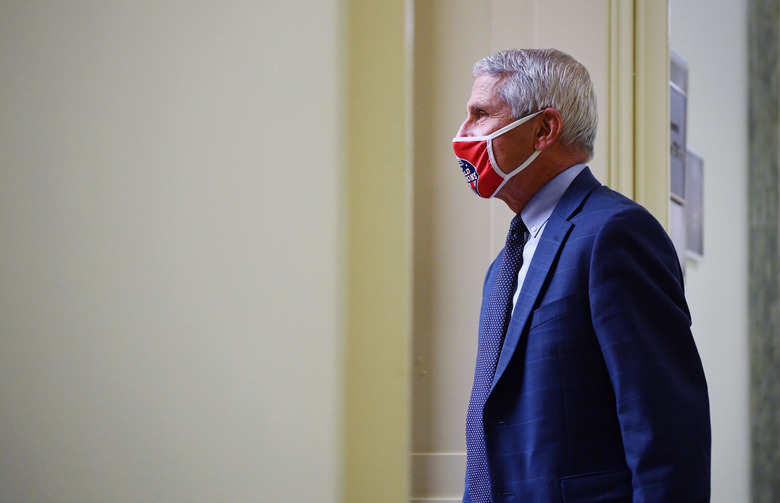Dr. Fauci Reveals His Single Biggest Regret About The Coronavirus Pandemic
- The latest coronavirus update shows that the US is recording more than 207,000 new COVID-19 cases every day, based on a seven-day average of data.
- White House health advisor Dr. Anthony Fauci has expressed regret in a new interview about one of the key aspects of the US coronavirus response — the lack of a coordinated national strategy early on.
- Read on for some of the other regrets Dr. Fauci has about the way the US coronavirus response was handled.
The US response to the coronavirus pandemic has been many things over the past year — messy, protracted, politically divisive, and a catastrophic blunder that has now left more than 406,000 Americans dead. Those are just some of the descriptors that come to mind, especially when considering the latest coronavirus update. At the moment, the US is recording at least 207,300 new COVID-19 cases every day, according to a seven-day average of Johns Hopkins University data calculated by CNBC.
It should be no surprise, then, that the public health expert who became the trusted face of the US response to the pandemic, White House health advisor Dr. Anthony Fauci, has confessed to a few regrets about the way the US handled its response to this once-in-a-century health crisis. A response that, knock on wood, is about to change in a big way with the inauguration Wednesday of President-elect Joe Biden, who's promised to "manage the hell" out of what promises to be the most daunting logistical challenge the US has ever faced, referring to the continued rollout of COVID vaccines.
Dr. Fauci, who also directs the National Institute of Allergy and Infectious Diseases, recently sat down with a local TV news station in New York and confessed to a number of regrets about the US response to the COVID-19 pandemic — with the one right off the top being the absence of a coordinated effort to respond to the virus, as opposed to 50 individual state responses to the pandemic.
"We're living in a very divisive society ... and when you're in a divisive society, then all of a sudden public health matters become politicized," Dr. Fauci said. "When they become politicized, you've got a problem." As an example, he pointed to how divisive an issue the wearing of face masks in response to the pandemic has become. "If someone doesn't want to wear a mask because they think it's a political statement, that's a problem."
If he could go back in time and change certain aspects of how the US responded to the COVID pandemic, that would be at the top of the list. Think back, for example, to the early days, when states where scrambling to obtain PPE from the federal government, for example, essentially needing to out-flank other states to do so.
In other interviews, Dr. Fauci has also expressed regret about some additional aspects of how the US responded to the pandemic — which arguably played a big role in President Trump's failure to win re-election and confronts Biden with a whole slew of monumental challenges right from the get-go. Those other aspects include:
- Wishing that he would have come out stronger early in favor of mask-wearing. His original stance suggested people didn't have to wear masks everywhere, to preserve masks for health care workers.
- Dr. Fauci also wishes he would have been even stronger in his advocacy of widespread COVID testing early, to get a better sense of where the virus was in the US.
- He also wishes he wouldn't have been so quick to seemingly criticize the UK's swift approval of Pfizer's COVID vaccine.
